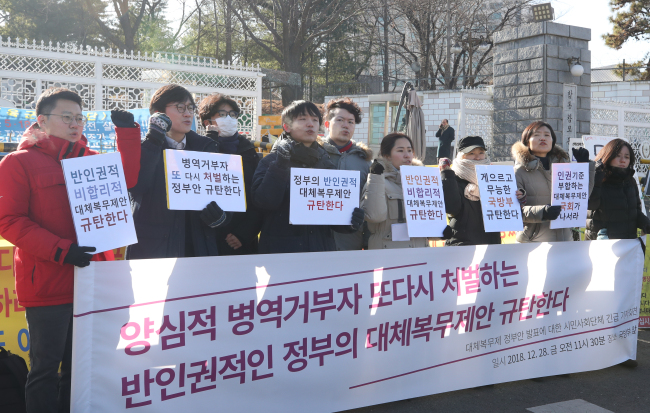The government has finalized plans for alternative service for conscientious objectors, but controversy over the matter looks likely to continue.
On Friday, the Ministry of National Defense announced plans to introduce 36 months of service at correctional facilities for conscientious objectors who refuse to serve in the military.
The measure was drawn up as the country’s top court has recognized conscientious objection as a valid reason for rejecting mandatory military service.
According to the Ministry of National Defense, the alternative service plan is to take effect on Jan. 1, 2020. The scheme will be summited to the National Assembly for parliamentary approval next year.
The Defense Ministry said its own panel would determine who is eligible to replace their mandatory military service with alternative duty, with the number of alternative service personnel limited to 600 every year. However, 1,200 personnel will be assigned for the special duty in 2020 alone.
“We have been seeking to come up with an ideal alternative service system that can reconcile the principle of military duty and conscientious freedom,” Lee Nam-woo, chief of the ministry’s personnel welfare office, said during a press briefing.
“While upholding the principle of fairness when it comes to carrying out military duty, we have established the alternative military service in a way that prevents abuse by those seeking to avoid military duty.”
 |
Civic groups and activists hold a press conference in Seoul on Friday to protest the Defense Ministry's plan regarding alternative service for conscientious objectors. (Yonhap) |
Every able-bodied man in South Korea is required to serve at least 21 months in the military between the ages of 18 and 28. The Military Service Act calls for up to three years in prison for those who refuse to serve, though most serve 18 months.
Some human rights groups and progressive activists have criticized the government’s plan, saying 36 months are too long for an alternative service program and citing programs in other countries as examples.
While there is no internationally recognized standard for how long an alternative service program should last, the UN Human Rights Committee says it should not be punitive in nature by imposing a service period that far exceeds the length of mandatory military service.
“It is unbelievable that the Moon Jae-in administration came up with such an absurd alternative service plan,” activists from People’s Solidarity for Participatory Democracy and other civic groups said during a press conference Friday.
“The UN and other international organizations would most likely demand changes to the government’s plan for alternative service. It would also be determined unconstitutional by the Constitutional Court.”
The Defense Ministry said that “once the alternative system is settled,” it would come up with plans to allow conscientious objectors to serve a shorter period and replace their service at correctional facilities with those at fire stations or other community service centers.
The government has sought to determine the ideal duration of an alternative service program since the Supreme Court ruled on Nov. 1 that conscientious objection is a valid reason to refuse to perform mandatory military service.
In June, the Constitutional Court ordered the government to introduce civilian forms of service for conscientious objectors. The court ruled that the Military Service Act was unconstitutional and demanded the government and lawmaker revise the law by the end of next year.
By Yeo Jun-suk (
jasonyeo@heraldcorp.com)





![[Herald Interview] 'Trump will use tariffs as first line of defense for American manufacturing'](http://res.heraldm.com/phpwas/restmb_idxmake.php?idx=644&simg=/content/image/2024/11/26/20241126050017_0.jpg)

![[Health and care] Getting cancer young: Why cancer isn’t just an older person’s battle](http://res.heraldm.com/phpwas/restmb_idxmake.php?idx=644&simg=/content/image/2024/11/26/20241126050043_0.jpg)
